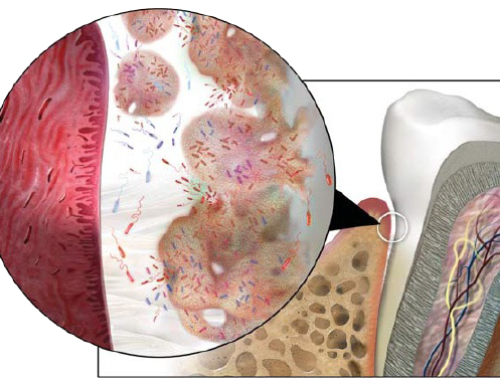Do genetics have anything to do with gum disease?
The simple answer is yes. In fact, scientists have even been able to isolate the specific genetic factor that makes a person more susceptible to gum disease: interleukin-1. “Research has indicated that some people may be genetically susceptible to gum disease,” the American Academy of Periodontology finds (1). What is the mechanism that makes interleukin-1 work? If your cells produce cytokine or interleukin-1, you will be more prone to have not only gum disease but also serious gum disease.
Gum Disease by the Numbers
• Seventy percent of adult Americans have some sort of periodontal problem.
• Almost one half of American adults over the age of thirty have periodontal disease.
• Almost one third of American adults has the hereditary factors that indicate problems with periodontal disease.
• Ten to fifteen percent of the population is included in a high-risk group for severe periodontal disease that relates to “inherited elements of susceptibility” (1).
• Seventy percent of people 65 and older are more likely to have periodontal disease (1).
Stages of Gum Disease
Gingivitis: Stage one begins with bacteria or plaque collecting on the teeth. Plaque is what causes tooth decay. If not removed regularly by brushing, it builds up and causes damage – not only tooth decay but also disease of the gingiva or gums. Tartar, or calculus, is a hard buildup on the teeth that must be removed professionally, which is the reason you go to your hygienist for cleaning (2).
The main cause of periodontal disease is a buildup of plaque and calculus on the teeth (2).
Periodontitis: Stage two occurs when not only the gums are affected by bacterial infection, but also that infection has now damaged the ligaments and bone that anchor teeth in the mouth. If no intervention is conducted, tooth loss may occur.
Good News: If you know you have the hereditary propensity for gum disease, you can institute protocols now to reduce the likelihood of your getting periodontal disease.
Bad News: If you already have been diagnosed with periodontal disease, you cannot cure it, but you can manage it with the help of your dentist and at home with a good oral care regimen.
As a general rule, inheritance is a good thing. Let’s just say that knowing what you inherit in the way of health risks is also a good thing, for that allows you to plan to save yourself from trouble. But you should also know that more than hereditary conditions put you at risk for gum disease and consequently, tooth loss. The more risk factors present, the greater the effort should be to avoid gum disease and its consequences.
Changing homecare coupled with dental hygiene check ups is a good way to reduce your risk of gum disease. Clean Kiss theraputic mouthwash and toothpaste is money back guaranteed to reduce pocket depth when used twice daily as directed. Get both at cleankiss.com/shop and if this is your first order with us, use firstkiss coupon for free shipping. Already love us? Get Free shipping when you subscribe for 3 month autoship.
References
1. Asa, R. (2015 September 16). “Is gum disease hereditary?” Retrieved June 2, 2020, from https://www.yourcareeverywhere.com/stay-well-and-fit/dental-hygiene/is-gum-disease-hereditary-.html
2. Greene, S. A. (2004). “Periodontal (Gum) Disease.” Retrieved June 2, 2020, from http://www.qualitydentistry.com/newsletter/main/perio_dis/






Leave A Comment